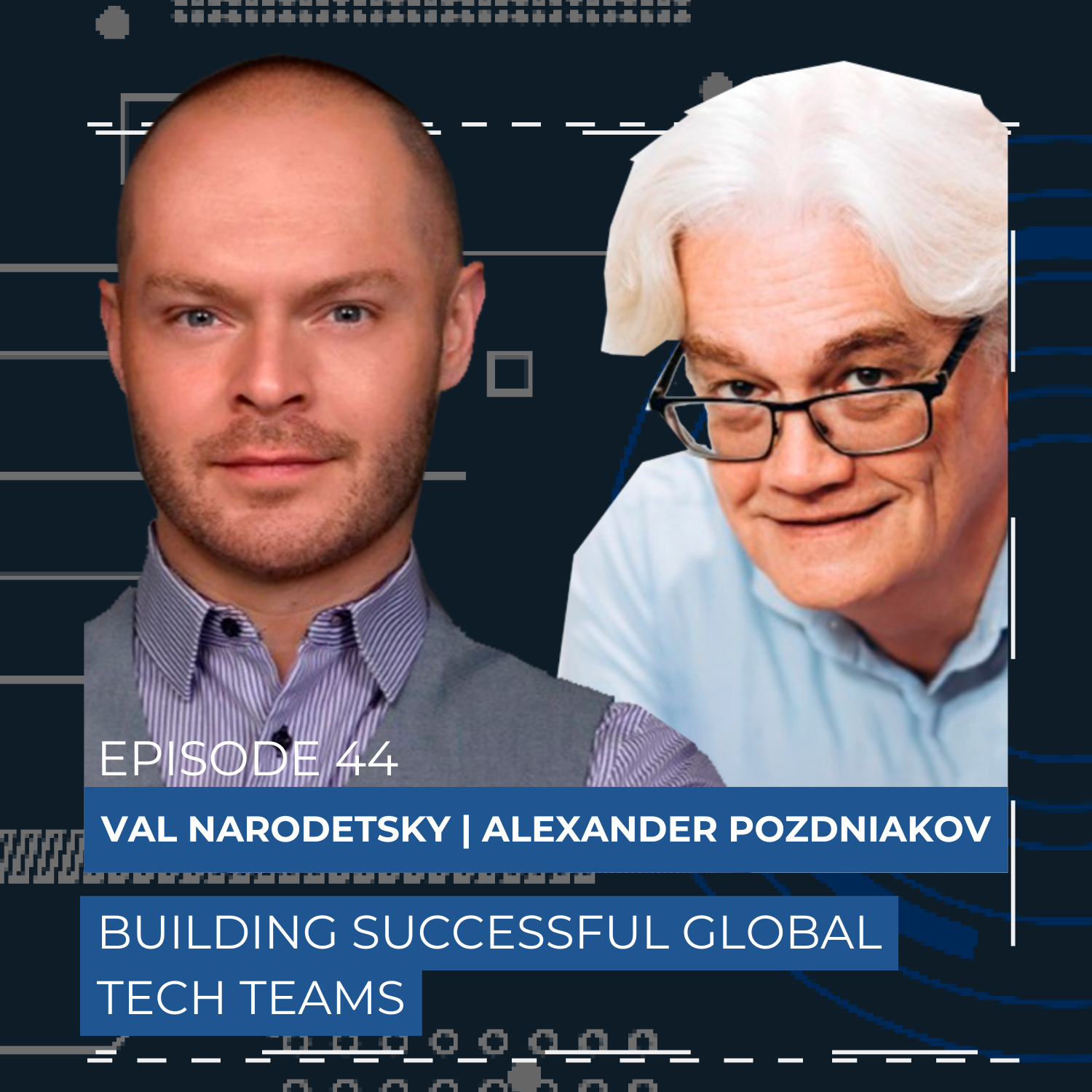Technology and software development know no borders. As more and more tech companies collaborate with talent from around the globe, navigating these international partnerships has become a critical topic.
This week on Scaling Tech, Arin sits down with two industry experts, Val Narodetsky and Alexander Pozdniakov, to explore the ins and outs of managing global teams. Val Narodetsky is the Founder and CEO of Hire Odesa, and Alexander Pozdniakov is the COO at First Line Software.
Both companies leverage international teams, but each operates with its own unique business model and approach. Drawing on their extensive experience, Val and Alexander share valuable insights into how tech companies can effectively manage and scale remote teams. They dive into the nuance of working with developers from different regions, exploring the benefits of nearshoring, the challenges of offshoring, and how companies can navigate the complexities of international laws, data privacy, and cultural differences.
If you’re thinking about expanding internationally or navigating global tech partnerships, this episode is full of valuable advice you won’t want to miss!
Listen to the full episode on Spotify
Listen to the full episode on Apple Podcasts
Complete interview with Val Narodetsky (Odesa) on YouTube
Complete interview with Alexander Pozdniakov (First Line Software) on YouTube
Watch the video:
Key Insights are below
About Guests:
Name: Val Narodetsky | Alexander Pozdniakov
What they do: Val is the Founder & CEO of Hire Odesa. Alexander is the COO at First Line Software.
Company: Hire Odesa | First Line Software
Where to find them: Val’s LinkedIn | Alexander’s LinkedIn
Key Insights
⚡Tech companies prioritize the U.S. market over Europe due to its large, unified economy. The U.S. market offers a large, unified landscape that allows tech companies to scale more easily. In contrast, Europe is a fragmented market requiring a more tailored approach for each country, which ultimately makes expansion more complex. Alexander explains, “In each country in Europe, you have to have your own sales. So in Germany, you have to invest in sales in Germany, in the Netherlands, in France, you have to invest and it’s very fragmented. And every market is smaller than the U.S. In the U.S. you invest in sales and marketing, and you get the faster benefits out of it.”
⚡Staff augmentation or project-based: which model is a better fit for your company? Staff augmentation involves external workers joining a team long-term, while project-based work focuses on external teams completing specific projects. Alexander’s team primarily does staff augmentation, while Val’s team provides a subscription model that combines staff augmentation with a base fee for unlimited recruiting. Arin summarizes, “If your team is looking for very specialized talent or talent that is hard to find, then staff augmentation is a good way to go.”
⚡AI is not replacing developers but accelerating their potential. AI is revolutionizing software development in many different ways. Alexander shares his thoughts on the future of AI in this field. He says, “It gives a lot of opportunities for people who need to grow because AI and using any tools of AI don’t make any senior more senior, but in the middle range engineers, they can make a senior. They can be performed like a senior in terms of speed. They cannot do it in terms of experience because experience you gain over the years or the different layers of the project but in terms of speed, it gives a huge opportunity.”
Episode Highlights
Two main reasons for using nearshore and staff augmentation are talent shortage and pricing.
The talent shortage in the U.S. is a major problem for tech companies which is why many turn to international markets for skilled professionals. As Val explains in this episode, the primary reason they choose Ukrainian engineers is the exceptional quality of talent available. He says, “Honestly, they’re coming to us for quality. They’re more quality-focused, and the cost savings acts as a cherry on top. It makes our process very easy to sell to a potential client because, given Ukraine’s reputation as far as one of the primary drivers of tech talent on a global scale, at least prior to the war, the clients that we’ve interacted with are fully aware of the quality output differences between Ukrainian tech talent, specifically engineers and US-based.”
Cost savings are a significant benefit of hiring offshore.
While talent quality is the primary focus, cost savings also play a vital role in the decision to hire international talent. Val says, “The hourly from our and at most, depending on the complexity and the height of talent and so on, does not exceed $50 per hour or something similar to that. Whereas utilizing a U.S. base equivalent, we’re going way outside of that norm, sometimes reaching way beyond $100 an hour, if not more, as well as the salaries and everything that’s associated with maintaining that. So, the savings are tremendous.”
The impact of geopolitics on international teams
Geopolitical events such as conflicts and regional instability can significantly affect international teams, something tech companies hiring offshore talent must carefully consider. It’s important to be aware of these risks and ensure proper protections and contingency plans are in place.
Val says, “You have to be prepared as a business owner. […] It’s data privacy, data protection, IP protection, minding the cultural differences, the legal implications and jurisdictions and how those play into working with somebody on the European side and also the tax implications. So, depending on how the talent is hired, how the contracts are put together, those four areas should be looked at very carefully by the prospective companies that are specifically U.S based and really just doing your homework and due diligence and being proactive when you’re actually moving forward.”

